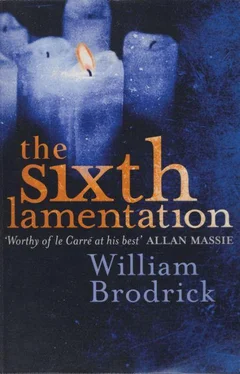William Brodrick - The Sixth Lamentation
Здесь есть возможность читать онлайн «William Brodrick - The Sixth Lamentation» весь текст электронной книги совершенно бесплатно (целиком полную версию без сокращений). В некоторых случаях можно слушать аудио, скачать через торрент в формате fb2 и присутствует краткое содержание. Жанр: Триллер, на английском языке. Описание произведения, (предисловие) а так же отзывы посетителей доступны на портале библиотеки ЛибКат.
- Название:The Sixth Lamentation
- Автор:
- Жанр:
- Год:неизвестен
- ISBN:нет данных
- Рейтинг книги:5 / 5. Голосов: 1
-
Избранное:Добавить в избранное
- Отзывы:
-
Ваша оценка:
- 100
- 1
- 2
- 3
- 4
- 5
The Sixth Lamentation: краткое содержание, описание и аннотация
Предлагаем к чтению аннотацию, описание, краткое содержание или предисловие (зависит от того, что написал сам автор книги «The Sixth Lamentation»). Если вы не нашли необходимую информацию о книге — напишите в комментариях, мы постараемся отыскать её.
The Sixth Lamentation — читать онлайн бесплатно полную книгу (весь текст) целиком
Ниже представлен текст книги, разбитый по страницам. Система сохранения места последней прочитанной страницы, позволяет с удобством читать онлайн бесплатно книгу «The Sixth Lamentation», без необходимости каждый раз заново искать на чём Вы остановились. Поставьте закладку, и сможете в любой момент перейти на страницу, на которой закончили чтение.
Интервал:
Закладка:
‘No, it’s not,’ she said, looking for the remote control. ‘It’s the Occupation. All those damned flags.’ Merde! Where is it?
When she glanced back at the screen, she saw him and lost her breath — a handsome youth in sepia, with thick, sensual lips, for all the world a reliable prefect. Agnes froze, her eyes locked on the flamboyant uniform. ‘My God, it’s him. It must be him,’ she whispered. Then she saw a sombre monk shaking his head. The item must have ended.
Agnes did not move for an hour. Then, purposefully, she opened the drawer of her bureau and took out one of the school notebooks she’d bought that morning. Not the first time, Agnes was struck by that puzzling confluence of events which passed for chance: that she should decide to commit the past to paper on the day circumstance seemed to be forcing it out into the open.
Chapter One
1
‘Sanctuary.’
‘My bottom!’
‘Honestly’
The Prior, Father Andrew, was fond of diluting harsher well-known expressions for monastic use, but the sentiment remained largely the same. He was an unconverted Glaswegian tamed by excessive education, but shades of the street fighter were apt to break out when grappling with the more unusual community problems.
‘It was abolished ages ago. He can’t be serious.
‘Well, he is,’ said Anselm.
‘When did he come out with that one?’
‘This morning, when Wilf asked him to leave.’
The Prior scowled. ‘I suppose he declined to oblige?’
‘Yes. And he told Wilf there’s nowhere he can go.’
The two monks were sitting on a wooden bench on the south transept lawn of the Old Abbey ruin. It was Anselm’s favourite spot at Larkwood. Facing them, on the South Walk cloister wall, were the remnants of the night stairs from the now vanished dorter. Anselm liked to sit here and muse upon his thirteenth-century ancestors, cowled and silent, making their way down for the night hours. The lawn, eaten by moss, spread away, undulating towards the enclosure fencing and beyond that to the bluebell path which led to the convent. It was a sharp morning. The Prior had just come back from a trip to London, having managed to miss the main item on all news bulletins. He’d returned home to find a gaggle of reporters and television crews camped on his doorstep.
‘Give it to me again, in order,’ said the Prior. He always insisted upon accurate chronologies.
‘The story broke in a local newspaper of all places. By the time the nationals got to his home he was here, claiming the protection of the Church.’
‘What did Wilf say?’
‘Words to the effect that the police wouldn’t pay any heed to Clement III.’
‘Who was Clement III?’
‘The Pope who granted the Order the right of sanctuary ‘
‘Trust Wilf to know that.’ Disconcerted, he added, ‘How did you know?’
‘I had to ask as well:
‘That’s all right then.’ He returned to his mental listing. ‘Go on, then what?’
‘Wilf rang the police. The first I knew about anything was when the media were at the gates. I had a few words with them, batting back daft questions.’
Father Andrew examined his nails, flicking his thumb upon each finger. ‘But why claim sanctuary? Where did he get the idea from?’
Anselm shifted uncomfortably He would answer that question at the right moment, not now It was one of the first lessons Anselm had learned after he’d placed himself subject to Holy Obedience: there’s a time and a place for honesty, and it is the privilege of the servant to choose the moment of abasement with his master.
The Prior stood and paced the ground, his arms concealed beneath his scapular. He said, ‘We are on the two horns of one dilemma.’
‘Indeed.’
They looked at each other, silently acknowledging the delicacy of the situation. The Prior spoke for them both.
‘If he goes, there’ll be international coverage of an old man protesting his innocence being handed over to the police; if he stays we’ll be damned for supporting a Nazi. Either way, to lapse into the vernacular, we’re shafted.’
‘Succinctly put.’
The Prior leaned on a sill beneath an open arcade in the south transept wall, reflectively brushing loose lichen with the back of his hand. Anselm joined him.
‘Father, I think one horn is shorter than the other and more comfortably straddled.’
‘Go on.’
‘The sooner he leaves the better. Otherwise we risk protracted public fascination with why he came here in the first place.’
With a tilt of the head the Prior drew Anselm away, leading him towards the stile gate and the bluebell path. ‘I’m going to find out what the sisters think. They had a Chapter this morning.’
As they walked through the grass, wet with dew, Anselm pursued his point. ‘If he’s forced to go now, any uproar will be short-lived. And there is an explanation we can give in the future if we get hammered for throwing an innocent man on to the street.’
‘Which is?’
‘This is a monastery, not a remand home for the elderly’ Anselm was pleased with the phrase. It was pithy and rounded: a good sound bite… prepared earlier.
The Prior nodded, mildly unimpressed. Anselm persevered, eyeing the Prior as he’d often eyed judges in another life when trying to read their minds.
‘The alternative is the other, longer horn. If he moves in, and that’s what it will amount to, we’re in trouble. There could be a trial.’ Anselm paused. ‘Nothing we say will convince anyone that we’re not on his side.’
They reached the stile and the Prior climbed over on to the path, gathering his black habit under one arm, the white scapular thrown over one shoulder. Anselm sensed him drifting away, chasing private thoughts. ‘We’ll find out more tomorrow night. Detective Superintendent Milby’s coming at six. I’d like you and Wilf to be there. Then we’ll have a Special Chapter. Let everyone know, will you?’
‘Yes, of course.
Anselm watched Father Andrew disappear along the path, across a haze of blue and purple, his habit swaying in the breeze, his head bowed.
2
Anselm had met Detective Superintendent Milby several times in the past. In those days Milby had been a foot soldier with the drugs squad. He’d had long hair and dressed in jeans, but had still managed to look like a policeman. Anselm had been a hack at the London Bar and their meetings had been limited to the pro-forma cross-examination about stitching up and excessive violence. Like all policemen familiar with the courts,
Milby had taken it in his stride. That was well over ten years ago and they’d both moved on since then.
Leaning against the stile gate, Anselm could almost smell the heavy scent of floor wax from his old chambers, and hear again the raucous laughter of competing voices in the coffee room. He smiled to himself, winsomely
When Anselm left the Bar it caused a minor sensation, not least because it was such a wonderful Robing Room yarn. Since it was endemic to the profession to treat such things with private gravity and public levity, Anselm only heard the lowered voices of shared empathy: ‘Tell me, old son, is it true? You’re off to a monastery? I can say this to you; we’ve all got secret longings. The job’s not everything…’
Anselm had knocked up ten years’ call but, unknown to his colleagues, had never fully settled into harness. There was a restlessness that started to grow shortly after he became a tenant. Imperceptibly he began to feel out of place, as if in a foreign land. There was another language, rarely spoken, and he wanted to learn it. Determined attempts to live a ‘normal’ life as a professional man floundered at regular but unpredictable intervals. He could be waiting for a taxi or heading off to court, doing anything ordinary, and he would suddenly feel curiously alienated from his surroundings. It was a sort of homesickness, usually mild, and occasionally acute. He later called these attacks by stealth ‘promptings’. All Anselm knew at the time was that they were vaguely religious in origin. He responded by purchasing various translations of the Bible and books on prayer, as if the answer to the puzzle lay somewhere between the pages. On one occasion he left a bookshop having ordered a thirty-eight volume edition of the Early Church Fathers. They remained as they came, in three cardboard boxes strapped with tape which he stacked in the corner of his living room and used as an inelegant resting place for coffee cups and take-away detritus. Anselm would then recover and continue his life at the Bar until ambushed by another God-ward impulse. It was a sort of guerrilla war for which he was always unprepared and ill-equipped. And all the while his book collection became larger, more comprehensive and unread. Eventually he stopped buying books. He realised one day while looking through a wide-angle lens that he wanted to become a monk.
Читать дальшеИнтервал:
Закладка:
Похожие книги на «The Sixth Lamentation»
Представляем Вашему вниманию похожие книги на «The Sixth Lamentation» списком для выбора. Мы отобрали схожую по названию и смыслу литературу в надежде предоставить читателям больше вариантов отыскать новые, интересные, ещё непрочитанные произведения.
Обсуждение, отзывы о книге «The Sixth Lamentation» и просто собственные мнения читателей. Оставьте ваши комментарии, напишите, что Вы думаете о произведении, его смысле или главных героях. Укажите что конкретно понравилось, а что нет, и почему Вы так считаете.












